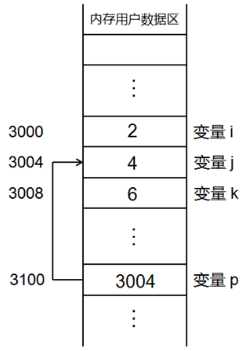0.目录
1.布尔类型
2.三目运算符
3.小结
1.布尔类型
C++中的布尔类型:
- C++在C语言的基本类型系统之上增加了bool
- C++中的bool可取的值只有true和false
- 理论上bool只占用一个字节
注意:
- true代表真值,编译器内部用1来表示
- false代表非真值,编译器内部用0来表示
布尔类型的值:
- bool类型只有true(非0)和false(0)两个值
- C++编译器会将非0值转换为true,0值转换为false
下面的代码输出什么?
#include <stdio.h>
int main()
{
bool b = 0;
printf("b = %d
", b);
b++;
printf("b = %d
", b);
b = b - 3;
printf("b = %d
", b);
return 0;
}
以上代码gcc编译不过,g++编译成功。
运行结果如下:
[root@bogon Desktop]# gcc test.c
test.c: In function ‘main’:
test.c:5: error: ‘bool’ undeclared (first use in this function)
test.c:5: error: (Each undeclared identifier is reported only once
test.c:5: error: for each function it appears in.)
test.c:5: error: expected ‘;’ before ‘b’
test.c:6: error: ‘b’ undeclared (first use in this function)
[root@bogon Desktop]# g++ test.c
[root@bogon Desktop]# ./a.out
b = 0
b = 1
b = 1
布尔类型是C++中的基本数据类型:
- 可以定义bool类型的全局变量
- 可以定义bool类型的常量
- 可以定义bool类型的指针
- 可以定义bool类型的数组
- 。。。
下面代码输出什么?
#include <stdio.h>
int main()
{
bool b = false;
int a = b;
printf("sizeof(b) = %d
", sizeof(b));
printf("b = %d, a = %d
", b, a);
b = 3;
a = b;
printf("b = %d, a = %d
", b, a);
b = -5;
a = b;
printf("b = %d, a = %d
", b, a);
a = 10;
b = a;
printf("a = %d, b = %d
", a, b);
a = 0;
b = a;
printf("a = %d, b = %d
", a, b);
return 0;
}
运行结果:
[root@bogon Desktop]# g++ test.cpp
[root@bogon Desktop]# ./a.out
sizeof(b) = 1
b = 0, a = 0
b = 1, a = 1
b = 1, a = 1
a = 10, b = 1
a = 0, b = 0
2.三目运算符
C++对三目运算符进行了升级。
下面的代码正确吗?
#include <stdio.h>
int main()
{
int a = 1;
int b = 2;
(a < b ? a : b) = 3;
printf("a = %d, b = %d
", a, b);
return 0;
}
运行结果:
[root@bogon Desktop]# gcc test.c
test.c: In function ‘main’:
test.c:8: error: lvalue required as left operand of assignment
[root@bogon Desktop]# g++ test.c
[root@bogon Desktop]# ./a.out
a = 3, b = 2
C语言中的三目运算符返回的是变量值——不能作为左值使用;
C++中的三目运算符可直接返回变量本身——既可作为右值使用,又可作为左值使用。
注意:三目运算符可能返回的值中如果有一个是常量值,则不能作为左值使用。
C++对三目运算符做了什么?
- 当三目运算符的可能返回都是变量时,返回的是变量引用
- 当三目运算符的可能返回中有常量时,返回的是值

那么何为引用呢?
变量名回顾:
- 变量是一段实际连续存储空间的别名
- 程序中通过变量来申请并命名存储空间
- 通过变量的名字可以使用存储空间
(问题:一段连续的存储空间只能有一个别名吗?)

在C++中新增加了引用的概念:
- 引用可以看作一个已定义变量的别名
- 引用的语法:
Type& name = var;

注意:普通引用在定义时必须用同类型的变量进行初始化。
下面的代码会输出什么?
#include <stdio.h>
int main()
{
int a = 4;
int& b = a;
b = 5;
printf("a = %d
", a);
printf("b = %d
", b);
printf("&a = %p
", &a);
printf("&b = %p
", &b);
return 0;
}
运行结果如下:
[root@bogon Desktop]# g++ test.cpp
[root@bogon Desktop]# ./a.out
a = 5
b = 5
&a = 0x7ffc082aaec4
&b = 0x7ffc082aaec4
(操作b就等于操作a,意味着b这个标识符和a这个标识符代表了内存里面同一段连续的空间。结论:在C++中完全可以对同一段连续的内存起任意多的别名。)
以下三个程序C++编译器编译都不过,请自行查找错误。
// test1.cpp
#include <stdio.h>
int main()
{
int a = 4;
float& b = a;
b = 5;
printf("a = %d
", a);
printf("b = %d
", b);
printf("&a = %d
", &a);
printf("&b = %d
", &b);
return 0;
}
// test2.cpp
#include <stdio.h>
int main()
{
int a = 4;
float& b;
b = 5;
printf("a = %d
", a);
printf("b = %d
", b);
printf("&a = %d
", &a);
printf("&b = %d
", &b);
return 0;
}
// test3.cpp
#include <stdio.h>
int main()
{
int a = 4;
float& b = 1;
b = 5;
printf("a = %d
", a);
printf("b = %d
", b);
printf("&a = %d
", &a);
printf("&b = %d
", &b);
return 0;
}
3.小结
- bool类型是C++新增加的基础类型
- bool类型的值只能是true和false
- C++中的三目运算符可作为左值使用
- C++中的引用可以看作变量的别名来使用
- 三目运算符的可能返回都是变量时,返回的是引用